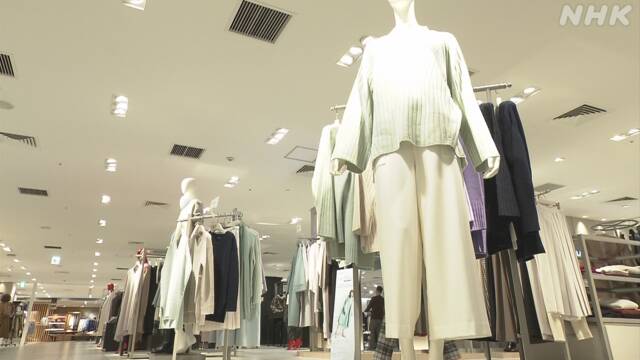Last month's sales at department stores across the country fell 29.7% compared to the same month last year.
Due to the state of emergency declared in Tokyo and Osaka, sales of stores in urban areas have dropped significantly.
According to the Japan Department Stores Association, last month's sales at 196 department stores nationwide fell 29.7% compared to the same month last year compared to existing stores.
It has been 16 consecutive months below the same month of the previous year.
Emergency declarations have been issued in 11 prefectures such as Tokyo, which has affected the shortening of business hours and the increasing tendency to refrain from going out, which is 16 points worse than in December last year before the declaration was issued.
In particular, the impact is greater in urban areas, with stores in 10 cities such as Tokyo and Osaka having minus 32.1%, while sales in other areas are only minus 23.2%, and sales with urban areas are high. You can see the difference.
By item, clothing fell sharply to minus 39.8%, and cosmetics also fell to minus 38.1%.
The Japan Department Stores Association believes that the movement to refrain from going out, especially in urban areas, has intensified last month, and the decline in sales has increased, and it is planning to recover sales by focusing on relatively strong online shopping. I will.
Stores in the city center live on "live commerce"
Among department stores in central Tokyo, where the number of customers is declining, there is a movement to increase sales by incorporating "live commerce," in which clerk sells products via live Internet broadcasting.
"Live commerce" is a sales method that is widely used mainly by major online shopping companies in China, and has recently been attracting attention in Japan as well.
The Daimaru store, which is adjacent to JR Tokyo Station, is planning to hold "live commerce" for the first time next month, and the store is preparing for the production.
After the business was closed, employees were practicing explaining the products in preparation for live broadcasting by installing tablet terminals and lighting equipment.
The "live commerce" at this store is "handmade" by employees, who perform and shoot.
In the production on the 4th of next month, we will sell beef and marine products from Fukushima prefecture, which also has the meaning of supporting reconstruction after the Great East Japan Earthquake, and employees will read through the script and adjust the shooting angle. I was doing it.
This store has been conducting regular online shopping, but as the number of customers actually visiting the store is decreasing, sales are achieved by incorporating "live commerce" and allowing employees to lively introduce the appeal of the product. There is an aim to connect to the up.
Mr. Masaaki Nakanishi of the Daimaru Tokyo store sales promotion department said, "Sales are still difficult in Corona. It is best for customers to come to the store, but I am unfamiliar with it, but I used" live commerce "to go to the store. I want to convey the appeal of the product to people who cannot come. "
Increase sales at home-based stores in suburban stores
Department store sales are widening between urban and suburban areas.
Sogo & Seibu is a store in Ikebukuro, Tokyo, where sales fell by nearly 30% from the same month last year, while sales in the suburbs of Totsuka-ku, Yokohama are down 15%, which is relatively low. It was only a small depression.
Since the spread of the new coronavirus infection, the store has strengthened measures to meet the needs of local residents, and in October last year, a part of the store was renovated to install a space for telework.
The aim is to have people who used to commute to work in Tokyo use it for teleworking, and when they go home, they also go shopping.
We are also focusing on the food floor.
In addition to opening new popular cafes and delicatessen stores, we have strengthened the lineup of sake and other alcoholic beverages, and have expanded the sales floor by arranging products that were previously only available at stores in Tokyo.
As a result, last month's food floor sales recovered to about the same level as last year, and since the beginning of this month, they have been at a faster pace than last year.
Kazuhiro Kawabata, who is in charge of the food floor, said, "I feel that the number of repeaters has increased because I can't go out in Corona. Since the store is rooted in the community, I would like to continue to keep in mind the product lineup that is supported by the locals. I was talking.

